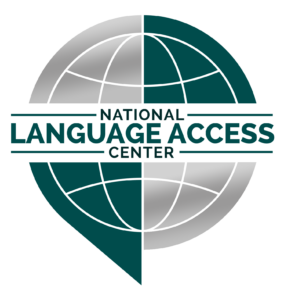Language Access in Healthcare: Ensuring Patient Safety and Compliance
In the diverse landscape of healthcare, where communication is paramount, language barriers can pose significant challenges to both patients and providers. For Limited English Proficient (LEP) individuals, navigating the complexities of medical terminology, treatment plans, and informed consent can be daunting, compromising their safety and well-being. This is where language access becomes not just a matter of compliance, but a crucial component of quality care.
The Role of Interpreters in Healthcare
Interpreters serve as a vital bridge between LEP patients and healthcare providers, facilitating clear and accurate communication. Their role extends far beyond simply translating words; they are cultural brokers, ensuring that nuances, cultural sensitivities, and non-verbal cues are accurately conveyed.
Improving Patient Safety
Accurate Information Gathering: Interpreters enable healthcare providers to obtain a complete and accurate medical history from LEP patients, including symptoms, allergies, and previous medical conditions. This reduces the risk of misdiagnosis and incorrect treatments.
Informed Consent: Through interpreters, patients can fully understand the risks and benefits of medical procedures, ensuring they can make informed decisions about their care.
Medication Adherence: Clear communication about medication instructions, dosage, and potential side effects improves patient adherence and reduces the risk of adverse drug reactions.
Emergency Situations: In critical situations, interpreters can quickly and accurately convey vital information, facilitating timely and appropriate medical interventions.
Enhancing Healthcare Compliance
Federal Laws and Regulations: Title VI of the Civil Rights Act prohibits discrimination based on national origin, including language, in programs and activities receiving federal financial assistance. This mandates that healthcare providers offer language access services to LEP patients.
Accreditation Standards: Many healthcare accreditation bodies, such as The Joint Commission, require organizations to demonstrate language access provisions as part of their quality and safety standards.
Ethical Considerations: Providing language access aligns with ethical principles of patient autonomy, beneficence, and non-maleficence, ensuring that all patients receive equitable and respectful care.
The Benefits of Translation in Healthcare
Beyond spoken communication, written translation plays a crucial role in ensuring language access in healthcare:
Patient Education Materials: Translating brochures, pamphlets, and online resources empowers LEP patients to understand their health conditions, treatment options, and preventive care measures.
Informed Consent Forms: Accurate translation of consent forms ensures that patients fully comprehend the procedures they are consenting to, protecting their rights and promoting ethical medical practices.
Medical Records: Translating medical records facilitates continuity of care and ensures that healthcare providers have access to complete and accurate patient information.
Signage and Wayfinding: Multilingual signage in healthcare facilities helps LEP patients navigate the environment and access services with ease.
Improving Health Outcomes
Studies have shown a strong correlation between language access and improved health outcomes for LEP patients:
Increased Patient Satisfaction: LEP patients who receive language assistance report higher satisfaction with their healthcare experiences.
Reduced Readmission Rates: Clear communication and understanding of discharge instructions can contribute to lower readmission rates.
Improved Medication Adherence: Accurate translation of medication labels and instructions leads to better medication adherence and fewer adverse drug events.
Enhanced Patient Safety: Language access reduces the risk of medical errors and adverse events, improving patient safety and overall quality of care.
The Role of Technology in Language Access
Technology plays an increasingly important role in facilitating language access in healthcare:
Telephonic Interpretation: Provides immediate access to interpreters over the phone for a wide range of languages.
Video Remote Interpretation: Connects patients and providers with interpreters remotely via video conferencing, offering visual and auditory communication.
Translation Software: While not a replacement for human translation, technology can assist with translating basic information and documents.
Multilingual Patient Portals: Online portals that offer information and services in multiple languages empower LEP patients to manage their healthcare needs.
Implementing Language Access: A Collaborative Approach
Effective language access requires a collaborative approach involving healthcare providers, interpreters, translators, technology experts, and community partners:
Language Needs Assessment: Conduct a thorough assessment to identify the language needs of the patient population.
Qualified Professionals: Utilize trained and certified interpreters and translators with expertise in medical terminology and cultural sensitivity.
Technology Integration: Leverage technology to enhance language access and streamline service delivery.
Staff Training: Educate healthcare staff on language access policies, procedures, and best practices for working with interpreters and LEP patients.
Community Outreach: Engage with LEP communities to understand their needs and preferences regarding language access services.
Language access is not merely a regulatory requirement; it is an ethical imperative and a critical component of quality healthcare. By investing in language services, healthcare organizations can improve patient safety, enhance compliance, and ultimately, contribute to better health outcomes for all.
Need Help?
As someone with firsthand experience in language access, I’m here to offer my expertise. I served for 22 years as a Spanish Interpreter at the Milwaukee County Courthouse, and I continue to provide professional interpreting services to organizations throughout Wisconsin. Whether you need an interpreter for a medical appointment, translation of vital documents, or assistance in developing a comprehensive language access plan, I can help. Don’t let language barriers compromise patient care—contact me today to ensure your healthcare organization is inclusive and accessible to all.






